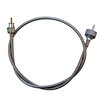- Joined
- Dec 7, 2018
- Messages
- 1,343
- Location
- The Lone Star State
- Display Name
Display name:
Chrisgoesflying
Although no longer a student, I see every flight as a training flight so I'm posting this here.
Today, I was on a long x-country flight that was cut short way too early. About an hour into the five hour flight, my tachometer became erratic in my Cherokee 140/160. I had it set to 2,400 rpm for cruise and suddenly it started jumping to 3,500, down to 2,000, back up to 3,000 and while doing so, making a strange, kind of grinding, noise. However, the engine appeared to be operating normal. I got good power and based on the engine sound, it responded appropriately to my power settings on the throttle.
To me it was an emergency (although I didn't declare one). Luckily, there was an airfield just a few miles south of my location so I pointed directly to the field. It's an airport pretty much in the middle of nowhere, small town, no services on the weekend, etc. so not a place I would normally land, especially not in the dead of winter at -17F. About an hour either way to the east or west, there would have been airports with services. Anyway, since I considered this an emergency, I landed at the tiny airport and I'm holed up with the family in a dingy little motel room where the heater is louder than the Cherokee without a headset on. I called my mechanic back home and he said it's most likely the tach cable that gave up. I then called a mechanic who is based an hour east at one of the larger airports and he said the same. He's coming over tomorrow to fix up the plane so we can get home. Both said since the engine wasn't revving up or down, I could have continued flight to a more preferred airport.
Question to some of the more seasoned pilots out there, would you have continued flight to another airport with services knowing there wouldn't be another airport for an hour either way or would you also have just landed at the nearest field even if that means landing in the middle of nowhere with no services?
Today, I was on a long x-country flight that was cut short way too early. About an hour into the five hour flight, my tachometer became erratic in my Cherokee 140/160. I had it set to 2,400 rpm for cruise and suddenly it started jumping to 3,500, down to 2,000, back up to 3,000 and while doing so, making a strange, kind of grinding, noise. However, the engine appeared to be operating normal. I got good power and based on the engine sound, it responded appropriately to my power settings on the throttle.
To me it was an emergency (although I didn't declare one). Luckily, there was an airfield just a few miles south of my location so I pointed directly to the field. It's an airport pretty much in the middle of nowhere, small town, no services on the weekend, etc. so not a place I would normally land, especially not in the dead of winter at -17F. About an hour either way to the east or west, there would have been airports with services. Anyway, since I considered this an emergency, I landed at the tiny airport and I'm holed up with the family in a dingy little motel room where the heater is louder than the Cherokee without a headset on. I called my mechanic back home and he said it's most likely the tach cable that gave up. I then called a mechanic who is based an hour east at one of the larger airports and he said the same. He's coming over tomorrow to fix up the plane so we can get home. Both said since the engine wasn't revving up or down, I could have continued flight to a more preferred airport.
Question to some of the more seasoned pilots out there, would you have continued flight to another airport with services knowing there wouldn't be another airport for an hour either way or would you also have just landed at the nearest field even if that means landing in the middle of nowhere with no services?

